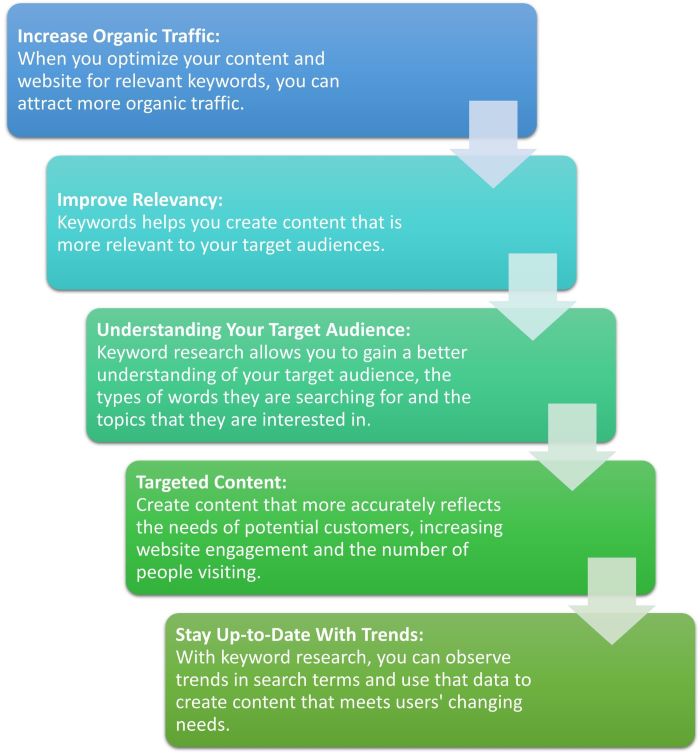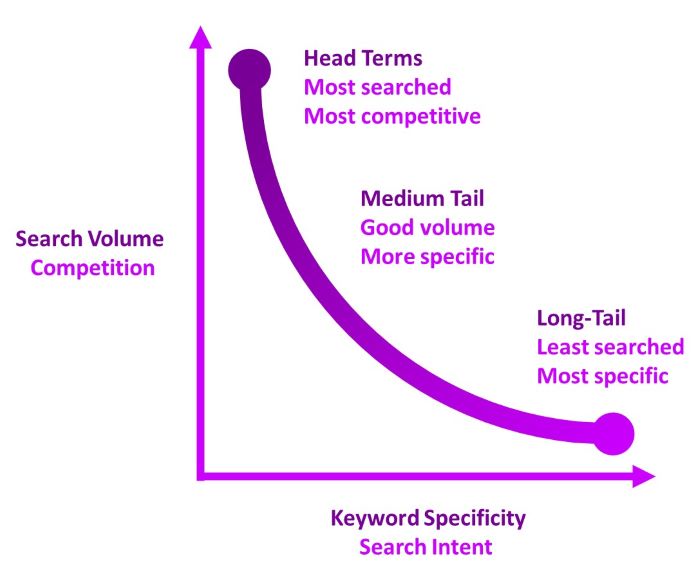Keyword research is an essential part of SEO (Search Engine Optimization). It allows you to target the most relevant keywords for your website and content (read more about writing excellent content here) that will bring you the most organic search engine traffic.
Keyword research is a process of discovering words and phrases that people search for in search engines. It’s the first step of SEO and involves discovering the most relevant and popular keywords for a website or a certain topic.
By leveraging keywords and phrases, you can get your content to appear in search engine results and increase organic traffic.
Benefits:

Two types of Keywords:
Short-tail keywords
|
Long-Tail Keywords
|
Where to discover relevant keywords:
Finding the right keywords to target can be a difficult task. There are two main ways to research keywords:
- You can use Google itself to find keywords
- You can use free or paid tools to find keywords
Using Google
People Also AskYou can leverage the “People Also Ask” (PAA) feature in search engines for keyword research effectively.
|
Search engine auto-complete suggestions
One of the most useful sources of keywords for SEO is search engine auto-complete suggestions. This feature suggests a list of words or phrases related to what you’re typing in the search box.
For example, if you enter “shoe” into the search box, Google might then suggest “shoe store” “mens shoes” or “running shoes” as possible search terms to explore.
This feature can provide inspiration for new keywords to target, as well as provide insight into how people are searching for the topic.
Search engine-related searches
Another useful source of keywords to explore are related searches featured at the bottom of search engine results pages.
For example, when you search “running shoes”, you’ll often find a list of suggested related search terms appearing below the initial results.
These are terms which people have searched in the past and can offer some insight into new topics or specific search terms to include in your SEO strategy.
Competitors’ Keywords
Your competitors’ websites are also a valuable source of keyword inspiration. Analyzing the content your competitors are publishing and the keywords they use can give you an idea of the kinds of search terms and topics to focus your SEO efforts on.
Tools for discovering and tracking keywords
Google Ads Keyword Planner
You can use Google Keyword Planner to discover ideas for new keywords and obtain useful data on search volume, competition and related terms.
Google Ads Search terms
If the SEO client is already doing Google Ads, you can use the Keyword Search Terms report to show the actual search queries that were used to trigger their ads – and thus will give you an insight into the keywords your audience is using.
Google Trends
Google Trends is a great platform for finding trending topics and keywords. The tool allows you to find out which topics and keywords are currently popular and gives you insight into how their popularity is evolving over time.
You can use this information to optimize your SEO campaigns with keyword ideas that will generate the most traffic.
AHREFS
Ahrefs Keywords Explorer is one of the most powerful keyword research tools on the market because of its robust search capabilities, accurate results, and helpful ranking metrics.
Ahrefs Keywords Explorer helps you quickly evaluate different keywords and phrases to see which ones your audience is most likely to respond to. It also helps you discover keyword variations and related search terms to help you get the best results for your content.
You can also use a tool like Ahrefs’ Site Explorer to explore the SEO performance of a competitor’s website, including which terms they’re targeting and the pages receiving the most traffic.
Ubersuggest
Ubersuggest is a great keyword research tool that allows you to find keyword ideas based on your seed keyword. This tool goes beyond what Google Keyword Planner and autocomplete can give you by providing search volume estimates and keyword suggestions based on your seed keyword.
How to choose the best keywords
-
Evaluate the search volume: You always want to target the keywords that have plenty of monthly searches. There is not usually much point in targeting words that have <10 searches per month if there are really good keywords that have 500 or 5000 searches per month.
-
Analyze keyword competition: You’ll also want to check the competition for your keywords. If the keyword is too competitive, you may struggle to rank for it. Try to look for keywords with low competition so you can have a better chance at ranking.
-
Find the right balance for your situation: For most businesses, the key is to get the right balance of search volume and competition.
-
A business just starting out with SEO should focus on medium search volume and medium competition.
-
Don’t go for heat pump as a keyword, as you are unlikely to beat the big companies in the early days. Try Heat Pump Hamilton instead, as that is more specific, and also has more buying intent.
-
That is, when someone searches for heat pumps they might be doing research. But when they search for heat pump Hamilton, they more likely want t buy one locally and are looking for a good deal.
-
-
Analyze the search intent: Analyze the search intent to determine if a keyword is worth targeting. That is, when people use a particular phrase in Google search, is it because they wish to purchase, or to do research?

Resources:
If you would like to learn more, watch these videos from Neil Patel.
